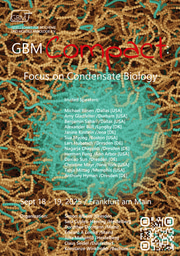73rd Mosbacher Kolloquium: The World of RNAs – Principles and Applications

Ribonucleic acids (RNA) are of fundamental importance to all living organisms and perform extremely diverse roles in their cells. Among other things, they transmit genetic information, have catalytic functions, direct proteins and control regulatory networks. In recent years, modern systems biology methods have been used to analyze complex transcriptomes and discover a large number of new RNA classes and RNA-binding proteins. The central role of RNA in regulatory and sensory processes is becoming better elucidated and is accompanied by the deciphering of new biological concepts. Furthermore, it has also become clear in recent years that most RNA classes are further modified by a variety of modifications. The so-called "epitranscriptome" describes this dynamic regulation of genetic information transfer and adaptation of RNA functions controlled by post-transcriptional modifications. More detailed mappings of the epitranscriptome reveal that the regulation of specific RNA modifications plays a significant role in many diseases.
The findings of this modern RNA research also point to the great potential of RNA for the diagnosis and treatment of disease. In this regard, the use of mRNA vaccines against COVID-19 represents a highly topical example of global importance. RNA molecules are being investigated as important building blocks for experimental therapies against bacteria, viruses, cancer, and various chronic diseases. RNA-based therapeutics are being used for rare inherited diseases and RNA-based agents are in initial clinical trials against Alzheimer's disease, asthma, diabetes, HIV, elevated cholesterol and tumorigenesis.
The 73rd Mosbacher Kolloquium 2022 is dedicated to both the study of RNA functions and modifications and the application of RNA in therapeutic approaches. The Kolloquium will bring together leading international experts in these areas of RNA research. A highlight will be the Feodor Lynen Honorary Lecture by Susan Gottesman, a pioneer in the study of regulatory sRNAs in bacteria. Stefanie Dimmeler will receive the Otto Warburg Medal and describe RNAs in the treatment of cardiovascular disease. Other recent work will be presented by conference speakers in three poster sessions and short talks. Young scientists will have the opportunity to learn about advances in current RNA research and the prospects for RNA therapies. The Junior-GBM is organizing a session and the event "Meet the Prof" at the 73rd Kolloquium, which allows young scientists to talk informally with presenters about research and career opportunities.
For this in-person event, participation requires a complete vaccination against Covid-19, a proof has to be presented on site.
Symposia and Speakers
Mechanisms and functions of regulatory RNAs
Rotem Sorek, Rehovot, Il
Sarah Woodson, Baltimore, USA
Julius Brennecke, Wien, AT
Nikolaus Rajewsky, Berlin, D
Ribonucleoproteins
Martin Jinek, Zurich, CH
Dina Grohmann, Regensburg, D
Susan Gottesman, Bethesda, USA (Feodor Lynen Lecture)
Junior GBM Session
Nina Papavasiliou, Heidelberg, D
Thomas Tuschl, New York, USA
Epitranscriptomics
Andres Jäschke, Heidelberg, D
Jean-Yves Roignant, Lausanne, CH
Ann Ehrenhofer-Murray, Berlin, D
Chuan He, Chicago, USA
Michaela Frye, Heidelberg, D
RNA Therapeutics
Frank Slack, Boston, USA
Alexander Dalpke, Dresden, D
Stefanie Dimmeler, Frankfurt, D (Otto Warburg Medal)
Jörg Vogel, Würzburg, D
Adrian Krainer, New York, USA
Muthiah Manoharan, Cambridge, USA
Andreas Kuhn, Mainz, D
Stefan Engelhardt, München, D



Join the FEBS Network today
Joining the FEBS Network’s molecular life sciences community enables you to access special content on the site, present your profile, 'follow' contributors, 'comment' on and 'like' content, post your own content, and set up a tailored email digest for updates.